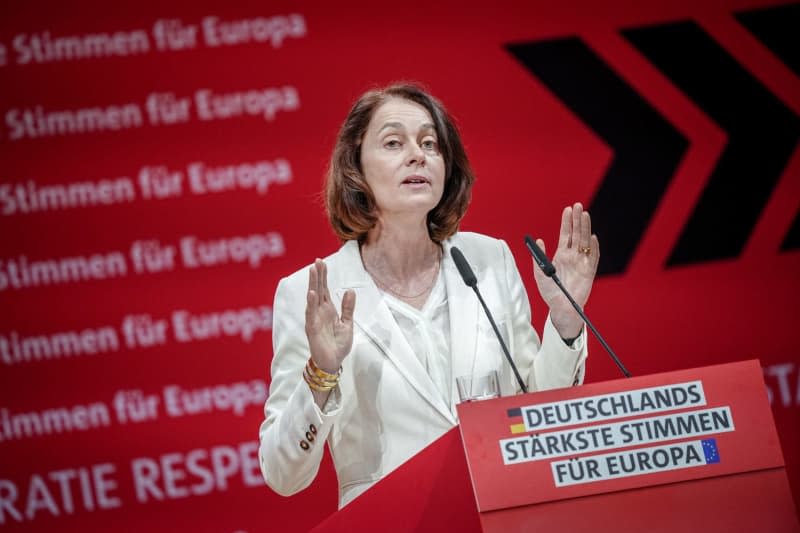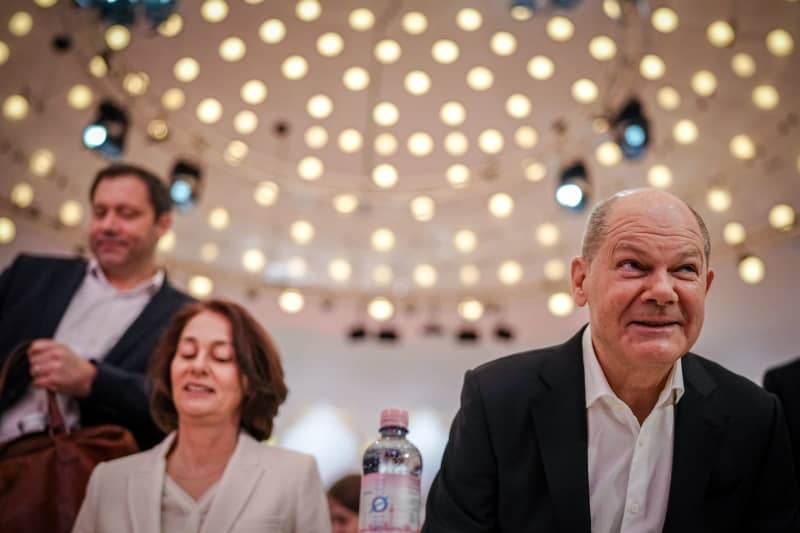Germany's Social Democrats choose Barley to lead EU election campaign

- Oops!Something went wrong.Please try again later.
- Oops!Something went wrong.Please try again later.
- Oops!Something went wrong.Please try again later.
- Oops!Something went wrong.Please try again later.
The vice president of the European Parliament, Katarina Barley, will lead Germany's Social Democrats (SPD) into the European elections after she received overwhelming support at a party conference in Berlin on Sunday.
Barley called for a determined campaign against right-wing populists and autocrats in the June 9 elections. "This is a decision on the future direction," Barley said with SPD leader Chancellor Olaf Scholz in attendance.
Conservatives and economic liberals wanted to reduce the European Union to merely an internal market and reduce protections, while others wanted to leave the bloc, Barley said in reference to the far-right Alternative for Germany (AfD), which is polling strongly.
"They would generate a serious emergency for the German economy in the briefest time," said Barley, a German-British dual citizen and who served as justice minister under Angela Merkel.
Barley slammed the AfD's objectives as "a programme against the working middle class." Terming the party "new Nazis," she said they aimed to undermine democracy and deport people of foreign origin, irrespective of whether they were German or not.
Barley accused the European Commission of failing to act against Hungarian Prime Minister Viktor Orbán's actions that blocked policies approved by other EU members.
"He's blackmailing the EU with his blockades," she said, pointing to EU support for Ukraine, expansion plans and the EU budget all held up by Hungary.
While the commission could withhold funding, it did not do so consistently enough, she said. "It's time for a clear message to be sent to Viktor Orban," Barley said. She called for the EU's unanimity principle to be abolished.
Turning to economic issues, Barley called for investment in the future. "Being climate-neutral by 2050 has the highest priority for us," she said in calling for an energy union to bring down prices.
Speaking at the opening of the pro-business Free Democrats (FDP) conference on Europe, FDP leader Christian Lindner, currently serving as finance minister in Scholz's three-party coalition, called on voters not to turn the European elections into a protest vote against the established parties by voting for the AfD.
"There's a lot at stake on June 9. It's not a protest, but rather an election on the shape of the EU," Lindner said.
He termed the AfD a threat to middle-class values and to democracy. "The AfD program would ruin Germany economically," he said.
Lindner pointed to the problems facing the EU in ensuring its security, competitiveness and orderly migration. "The problems are so big that they must be resolved at a European level or not at all," he said.
The AfD is currently polling above 20% nationwide and is in the lead in three states set to hold elections in the autumn.
FDP lawmaker Marie-Agnes Strack-Zimmermann, who is a fixture in debates about German defence and foreign policy, was chosen on Sunday to be her party's chief candidate.
The 27 states of the European Union will hold elections in June to determine the makeup of the next European Parliament and help determine the bloc's policies and priorities.
After parliament reconvenes following the elections, pan-European groups of like-minded political parties in the legislature will have a say in determining who is the next president of the European Commission, a role currently held by Ursula von der Leyen.
Elections to the European Parliament take place every five years.




